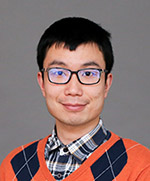从个体到群体:对单个细菌游动和光学可控活性物质系统的研究及潜在工程学应用
日期:2021/04/21 - 2021/04/21
学术讲座:从个体到群体:对单个细菌游动和光学可控活性物质系统的研究及潜在工程学应用
主讲人:Dr. Zijie Qu, from California Institute of Technology
时间:2021年4月21日(周三)上午9:00-10:00
地点:密西根学院龙宾楼454会议室
讲座摘要
Biological systems survive by constantly interacting with their ambient environment and their abilities to navigate, transport and sense are far from human technology. However, we have limited knowledge of these capabilities such as how they achieve precise flow control for swimming, inter/intracellular transportation, cell division, etc. Understanding the physical process of biological system-environment interaction will also provide insight for us to build novel devices that allow exquisite control on various length scales.
In this talk, two major topics will be covered. The first is on the swimming behavior of flagellated bacteria E. coli in both viscous and non-Newtonian media. By tracking individual cells, we study the impact of fluid properties, such as viscosity and viscoelasticity, on the swimming modality of E. coli. In the second work, we use the light-activable motor proteins to demonstrate the capacity to control and program the contraction and deformation of the microtubule network and to generate persistent fluid flows, which helps us understand a range of biological processes and provides an ideal platform for a variety of applications. The connection between these two projects and an outlook for future study on some specific engineering applications will also be discussed.
主讲人简介
 Zijie Qu received his BSc from the School of Mechanical Engineering at Shanghai Jiao Tong University (2013), his MSc from Purdue University (2014) in Mechanical Engineering and his PhD from Brown University (2018) in Engineering. His PhD work mainly focused on the swimming problem of cells in viscous and non-Newtonian fluids using experimental approaches. Additionally, he studied the non-Newtonian properties of dilute polymer solutions with micro-rheology. His major contribution includes building a three-dimensional real-time tracking microscope to measure individual cell motility and clarifies some contradictory results for bacteria swimming. Zijie Qu joined the Thomson Lab at California Institute of Technology in 2018, where he became interested in an optically controlled microtubule-kinesin motor active matter system. He studied the fluid and polymer mechanics problems in such a simplified system with well-designed experimental methods. He achieved programmatic control of the contraction and deformation of the active matter networks as well as the associated fluid flows, which lead to an ideal engineering platform for smart micromachines and devices.
Zijie Qu received his BSc from the School of Mechanical Engineering at Shanghai Jiao Tong University (2013), his MSc from Purdue University (2014) in Mechanical Engineering and his PhD from Brown University (2018) in Engineering. His PhD work mainly focused on the swimming problem of cells in viscous and non-Newtonian fluids using experimental approaches. Additionally, he studied the non-Newtonian properties of dilute polymer solutions with micro-rheology. His major contribution includes building a three-dimensional real-time tracking microscope to measure individual cell motility and clarifies some contradictory results for bacteria swimming. Zijie Qu joined the Thomson Lab at California Institute of Technology in 2018, where he became interested in an optically controlled microtubule-kinesin motor active matter system. He studied the fluid and polymer mechanics problems in such a simplified system with well-designed experimental methods. He achieved programmatic control of the contraction and deformation of the active matter networks as well as the associated fluid flows, which lead to an ideal engineering platform for smart micromachines and devices.
Zijie Qu’s research interest lies in designing and manufacturing bio-inspired micro/nano robots, microfluidic devices and soft materials for biomedical and engineering purposes while understanding the physics in a wide range of biological processes including microorganism locomotion, collective behavior, inter/intracellular transportation, etc. He does interdisciplinary research with people from fluid mechanics, physics, engineering, computer science, and applied mathematics.
